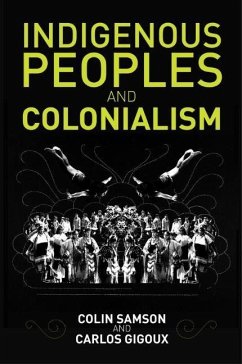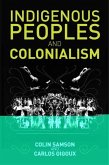Indigenous peoples have gained increasing international visibility in their fight against longstanding colonial occupation by nation-states. Although living in different locations around the world and practising highly varied ways of life, indigenous peoples nonetheless are affected by similar patterns of colonial dispossession and violence. In defending their collective rights to self-determination, culture, lands and resources, their resistance and creativity offer a pause for critical reflection on the importance of maintaining indigenous distinctiveness against the homogenizing forces of states and corporations.
This timely book highlights significant colonial patterns of domination and their effects, as well as responses and resistance to colonialism. It brings indigenous peoples' issues and voices to the forefront of sociological discussions of modernity. In particular, the book examines issues of identity, dispossession, environment, rights and revitalization in relation to historical and ongoing colonialism, showing that the experiences of indigenous peoples in wealthy and poor countries are often parallel and related.
With a strong comparative scope and interdisciplinary perspective, the book is an essential introductory reading for students interested in race and ethnicity, human rights, development and indigenous peoples' issues in an interconnected world.
Hinweis: Dieser Artikel kann nur an eine deutsche Lieferadresse ausgeliefert werden.
This timely book highlights significant colonial patterns of domination and their effects, as well as responses and resistance to colonialism. It brings indigenous peoples' issues and voices to the forefront of sociological discussions of modernity. In particular, the book examines issues of identity, dispossession, environment, rights and revitalization in relation to historical and ongoing colonialism, showing that the experiences of indigenous peoples in wealthy and poor countries are often parallel and related.
With a strong comparative scope and interdisciplinary perspective, the book is an essential introductory reading for students interested in race and ethnicity, human rights, development and indigenous peoples' issues in an interconnected world.
Hinweis: Dieser Artikel kann nur an eine deutsche Lieferadresse ausgeliefert werden.
"The question of indigenous peoples is perhaps one of the most important political matters of recent decades in many parts of the world. Peoples and communities that seemed to have disappeared have returned to the political arena, sometimes taking centre-stage. This book unpacks in detail this social and political phenomenon, presenting a diverse range of timely and relevant voices and perspectives."
José Bengoa, Universidad Academia de Humanismo Cristiano, Chile
"Samson and Gigoux present an impressive, global account of the colonization of many indigenous peoples. They demonstrate how colonialism, modernism and Western liberalism are intertwined as prime movers of their subjugation. Their account shows why these colonial processes are harmful to all of us, not just to indigenous peoples."
Thomas D. Hall, DePauw University
José Bengoa, Universidad Academia de Humanismo Cristiano, Chile
"Samson and Gigoux present an impressive, global account of the colonization of many indigenous peoples. They demonstrate how colonialism, modernism and Western liberalism are intertwined as prime movers of their subjugation. Their account shows why these colonial processes are harmful to all of us, not just to indigenous peoples."
Thomas D. Hall, DePauw University








